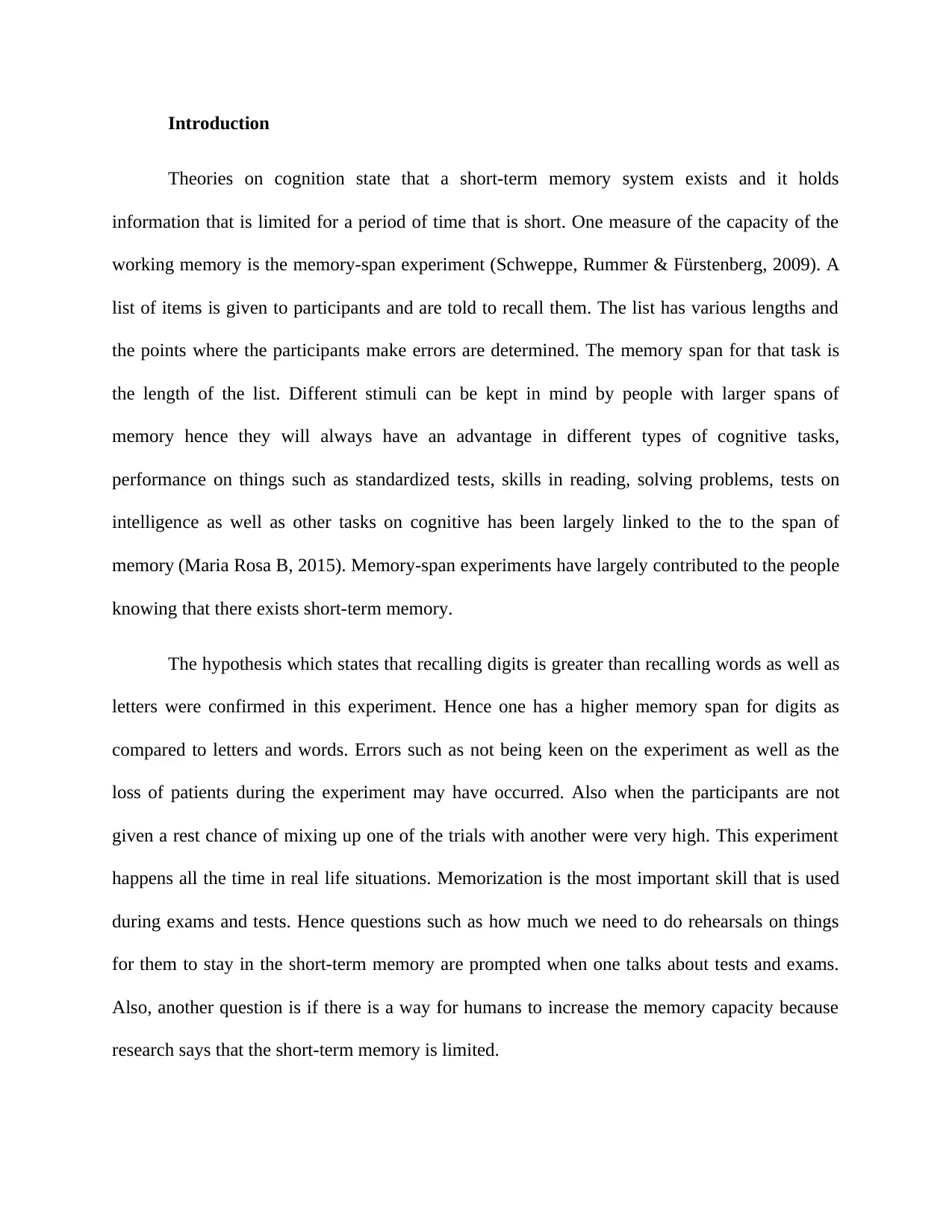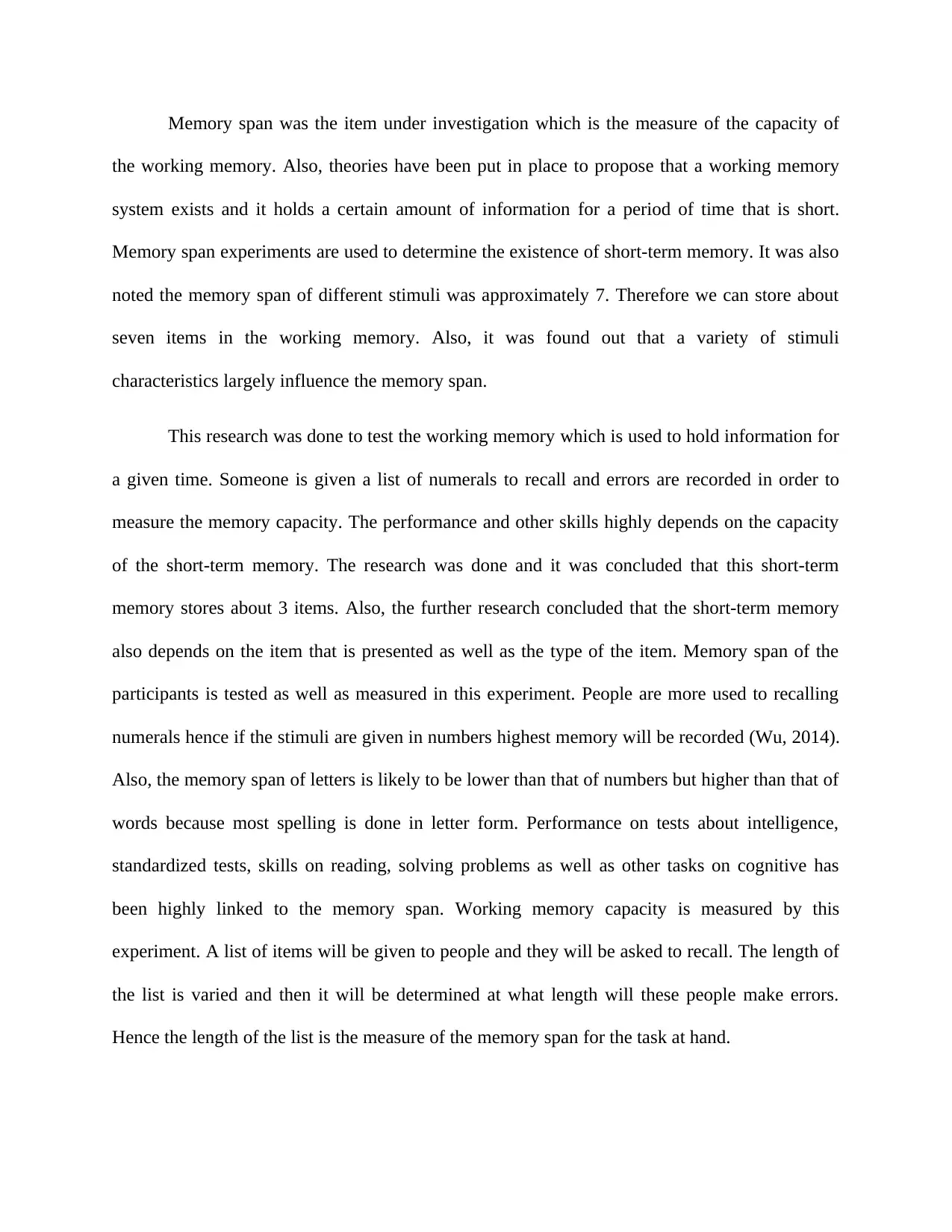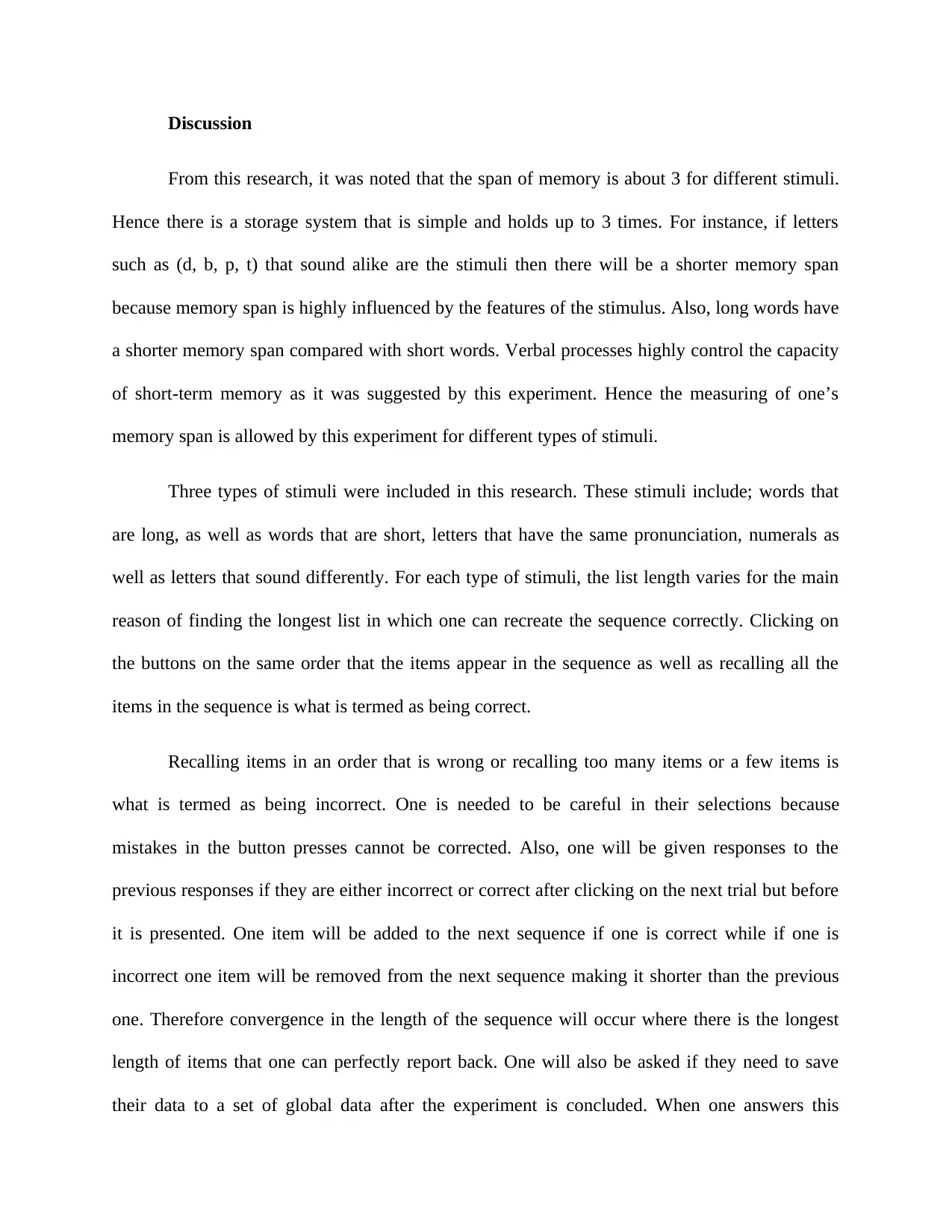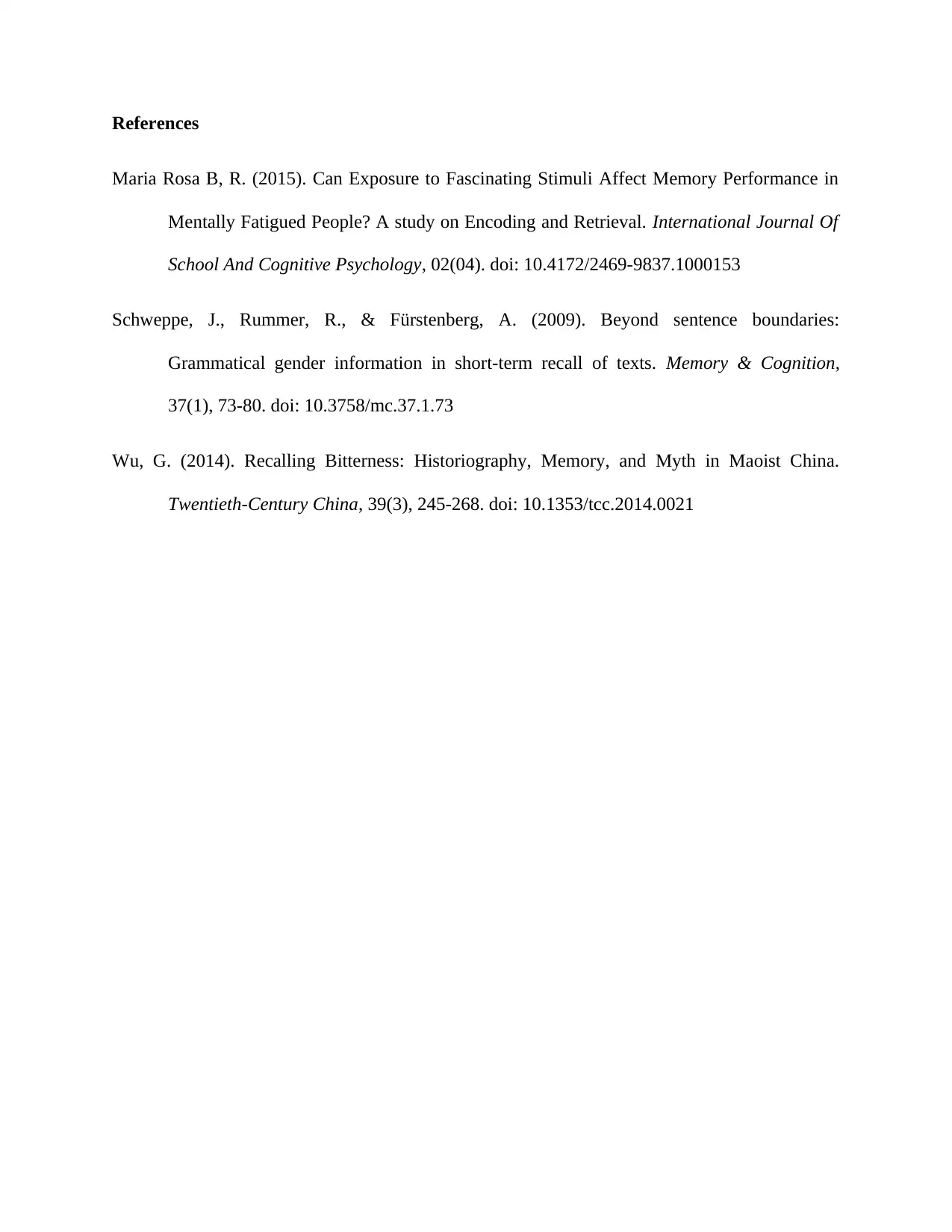University of Murdoch - PSY294: Memory Span Lab Report and Analysis
VerifiedAdded on 2023/06/10
|5
|1280
|128
Report
AI Summary
This lab report details a memory span experiment conducted to investigate working memory capacity. The study involved undergraduate psychology students from the University of Murdoch who participated in an online experiment using Coglab. Participants were presented with lists of varying lengths consisting of different stimuli (words, letters, and numerals) and asked to recall them in the correct order. The primary objective was to determine the memory span, which is the maximum number of items a participant could accurately recall. The report discusses the experimental design, the materials used, and the procedures followed, including the repeated-measures ANOVA employed for data analysis. The results indicated that memory span is influenced by the characteristics of the stimuli, with a general capacity of approximately three items. The findings also highlight the significance of memory span in various cognitive tasks, such as intelligence tests and problem-solving abilities. The report concludes by emphasizing the importance of understanding short-term memory and its limitations, as well as the implications of these findings for cognitive processes and performance.

Introduction
Theories on cognition state that a short-term memory system exists and it holds
information that is limited for a period of time that is short. One measure of the capacity of the
working memory is the memory-span experiment (Schweppe, Rummer & Fürstenberg, 2009). A
list of items is given to participants and are told to recall them. The list has various lengths and
the points where the participants make errors are determined. The memory span for that task is
the length of the list. Different stimuli can be kept in mind by people with larger spans of
memory hence they will always have an advantage in different types of cognitive tasks,
performance on things such as standardized tests, skills in reading, solving problems, tests on
intelligence as well as other tasks on cognitive has been largely linked to the to the span of
memory (Maria Rosa B, 2015). Memory-span experiments have largely contributed to the people
knowing that there exists short-term memory.
The hypothesis which states that recalling digits is greater than recalling words as well as
letters were confirmed in this experiment. Hence one has a higher memory span for digits as
compared to letters and words. Errors such as not being keen on the experiment as well as the
loss of patients during the experiment may have occurred. Also when the participants are not
given a rest chance of mixing up one of the trials with another were very high. This experiment
happens all the time in real life situations. Memorization is the most important skill that is used
during exams and tests. Hence questions such as how much we need to do rehearsals on things
for them to stay in the short-term memory are prompted when one talks about tests and exams.
Also, another question is if there is a way for humans to increase the memory capacity because
research says that the short-term memory is limited.
Theories on cognition state that a short-term memory system exists and it holds
information that is limited for a period of time that is short. One measure of the capacity of the
working memory is the memory-span experiment (Schweppe, Rummer & Fürstenberg, 2009). A
list of items is given to participants and are told to recall them. The list has various lengths and
the points where the participants make errors are determined. The memory span for that task is
the length of the list. Different stimuli can be kept in mind by people with larger spans of
memory hence they will always have an advantage in different types of cognitive tasks,
performance on things such as standardized tests, skills in reading, solving problems, tests on
intelligence as well as other tasks on cognitive has been largely linked to the to the span of
memory (Maria Rosa B, 2015). Memory-span experiments have largely contributed to the people
knowing that there exists short-term memory.
The hypothesis which states that recalling digits is greater than recalling words as well as
letters were confirmed in this experiment. Hence one has a higher memory span for digits as
compared to letters and words. Errors such as not being keen on the experiment as well as the
loss of patients during the experiment may have occurred. Also when the participants are not
given a rest chance of mixing up one of the trials with another were very high. This experiment
happens all the time in real life situations. Memorization is the most important skill that is used
during exams and tests. Hence questions such as how much we need to do rehearsals on things
for them to stay in the short-term memory are prompted when one talks about tests and exams.
Also, another question is if there is a way for humans to increase the memory capacity because
research says that the short-term memory is limited.
Paraphrase This Document
Need a fresh take? Get an instant paraphrase of this document with our AI Paraphraser

Memory span was the item under investigation which is the measure of the capacity of
the working memory. Also, theories have been put in place to propose that a working memory
system exists and it holds a certain amount of information for a period of time that is short.
Memory span experiments are used to determine the existence of short-term memory. It was also
noted the memory span of different stimuli was approximately 7. Therefore we can store about
seven items in the working memory. Also, it was found out that a variety of stimuli
characteristics largely influence the memory span.
This research was done to test the working memory which is used to hold information for
a given time. Someone is given a list of numerals to recall and errors are recorded in order to
measure the memory capacity. The performance and other skills highly depends on the capacity
of the short-term memory. The research was done and it was concluded that this short-term
memory stores about 3 items. Also, the further research concluded that the short-term memory
also depends on the item that is presented as well as the type of the item. Memory span of the
participants is tested as well as measured in this experiment. People are more used to recalling
numerals hence if the stimuli are given in numbers highest memory will be recorded (Wu, 2014).
Also, the memory span of letters is likely to be lower than that of numbers but higher than that of
words because most spelling is done in letter form. Performance on tests about intelligence,
standardized tests, skills on reading, solving problems as well as other tasks on cognitive has
been highly linked to the memory span. Working memory capacity is measured by this
experiment. A list of items will be given to people and they will be asked to recall. The length of
the list is varied and then it will be determined at what length will these people make errors.
Hence the length of the list is the measure of the memory span for the task at hand.
the working memory. Also, theories have been put in place to propose that a working memory
system exists and it holds a certain amount of information for a period of time that is short.
Memory span experiments are used to determine the existence of short-term memory. It was also
noted the memory span of different stimuli was approximately 7. Therefore we can store about
seven items in the working memory. Also, it was found out that a variety of stimuli
characteristics largely influence the memory span.
This research was done to test the working memory which is used to hold information for
a given time. Someone is given a list of numerals to recall and errors are recorded in order to
measure the memory capacity. The performance and other skills highly depends on the capacity
of the short-term memory. The research was done and it was concluded that this short-term
memory stores about 3 items. Also, the further research concluded that the short-term memory
also depends on the item that is presented as well as the type of the item. Memory span of the
participants is tested as well as measured in this experiment. People are more used to recalling
numerals hence if the stimuli are given in numbers highest memory will be recorded (Wu, 2014).
Also, the memory span of letters is likely to be lower than that of numbers but higher than that of
words because most spelling is done in letter form. Performance on tests about intelligence,
standardized tests, skills on reading, solving problems as well as other tasks on cognitive has
been highly linked to the memory span. Working memory capacity is measured by this
experiment. A list of items will be given to people and they will be asked to recall. The length of
the list is varied and then it will be determined at what length will these people make errors.
Hence the length of the list is the measure of the memory span for the task at hand.

Discussion
From this research, it was noted that the span of memory is about 3 for different stimuli.
Hence there is a storage system that is simple and holds up to 3 times. For instance, if letters
such as (d, b, p, t) that sound alike are the stimuli then there will be a shorter memory span
because memory span is highly influenced by the features of the stimulus. Also, long words have
a shorter memory span compared with short words. Verbal processes highly control the capacity
of short-term memory as it was suggested by this experiment. Hence the measuring of one’s
memory span is allowed by this experiment for different types of stimuli.
Three types of stimuli were included in this research. These stimuli include; words that
are long, as well as words that are short, letters that have the same pronunciation, numerals as
well as letters that sound differently. For each type of stimuli, the list length varies for the main
reason of finding the longest list in which one can recreate the sequence correctly. Clicking on
the buttons on the same order that the items appear in the sequence as well as recalling all the
items in the sequence is what is termed as being correct.
Recalling items in an order that is wrong or recalling too many items or a few items is
what is termed as being incorrect. One is needed to be careful in their selections because
mistakes in the button presses cannot be corrected. Also, one will be given responses to the
previous responses if they are either incorrect or correct after clicking on the next trial but before
it is presented. One item will be added to the next sequence if one is correct while if one is
incorrect one item will be removed from the next sequence making it shorter than the previous
one. Therefore convergence in the length of the sequence will occur where there is the longest
length of items that one can perfectly report back. One will also be asked if they need to save
their data to a set of global data after the experiment is concluded. When one answers this
From this research, it was noted that the span of memory is about 3 for different stimuli.
Hence there is a storage system that is simple and holds up to 3 times. For instance, if letters
such as (d, b, p, t) that sound alike are the stimuli then there will be a shorter memory span
because memory span is highly influenced by the features of the stimulus. Also, long words have
a shorter memory span compared with short words. Verbal processes highly control the capacity
of short-term memory as it was suggested by this experiment. Hence the measuring of one’s
memory span is allowed by this experiment for different types of stimuli.
Three types of stimuli were included in this research. These stimuli include; words that
are long, as well as words that are short, letters that have the same pronunciation, numerals as
well as letters that sound differently. For each type of stimuli, the list length varies for the main
reason of finding the longest list in which one can recreate the sequence correctly. Clicking on
the buttons on the same order that the items appear in the sequence as well as recalling all the
items in the sequence is what is termed as being correct.
Recalling items in an order that is wrong or recalling too many items or a few items is
what is termed as being incorrect. One is needed to be careful in their selections because
mistakes in the button presses cannot be corrected. Also, one will be given responses to the
previous responses if they are either incorrect or correct after clicking on the next trial but before
it is presented. One item will be added to the next sequence if one is correct while if one is
incorrect one item will be removed from the next sequence making it shorter than the previous
one. Therefore convergence in the length of the sequence will occur where there is the longest
length of items that one can perfectly report back. One will also be asked if they need to save
their data to a set of global data after the experiment is concluded. When one answers this
⊘ This is a preview!⊘
Do you want full access?
Subscribe today to unlock all pages.

Trusted by 1+ million students worldwide

question, the appearance of a new web page will happen and class averages for this experiment
will be listed. Also, a link to ones’ personal data will be on this page
will be listed. Also, a link to ones’ personal data will be on this page
Paraphrase This Document
Need a fresh take? Get an instant paraphrase of this document with our AI Paraphraser

References
Maria Rosa B, R. (2015). Can Exposure to Fascinating Stimuli Affect Memory Performance in
Mentally Fatigued People? A study on Encoding and Retrieval. International Journal Of
School And Cognitive Psychology, 02(04). doi: 10.4172/2469-9837.1000153
Schweppe, J., Rummer, R., & Fürstenberg, A. (2009). Beyond sentence boundaries:
Grammatical gender information in short-term recall of texts. Memory & Cognition,
37(1), 73-80. doi: 10.3758/mc.37.1.73
Wu, G. (2014). Recalling Bitterness: Historiography, Memory, and Myth in Maoist China.
Twentieth-Century China, 39(3), 245-268. doi: 10.1353/tcc.2014.0021
Maria Rosa B, R. (2015). Can Exposure to Fascinating Stimuli Affect Memory Performance in
Mentally Fatigued People? A study on Encoding and Retrieval. International Journal Of
School And Cognitive Psychology, 02(04). doi: 10.4172/2469-9837.1000153
Schweppe, J., Rummer, R., & Fürstenberg, A. (2009). Beyond sentence boundaries:
Grammatical gender information in short-term recall of texts. Memory & Cognition,
37(1), 73-80. doi: 10.3758/mc.37.1.73
Wu, G. (2014). Recalling Bitterness: Historiography, Memory, and Myth in Maoist China.
Twentieth-Century China, 39(3), 245-268. doi: 10.1353/tcc.2014.0021
1 out of 5
Related Documents
Your All-in-One AI-Powered Toolkit for Academic Success.
+13062052269
info@desklib.com
Available 24*7 on WhatsApp / Email
![[object Object]](/_next/static/media/star-bottom.7253800d.svg)
Unlock your academic potential
Copyright © 2020–2026 A2Z Services. All Rights Reserved. Developed and managed by ZUCOL.




